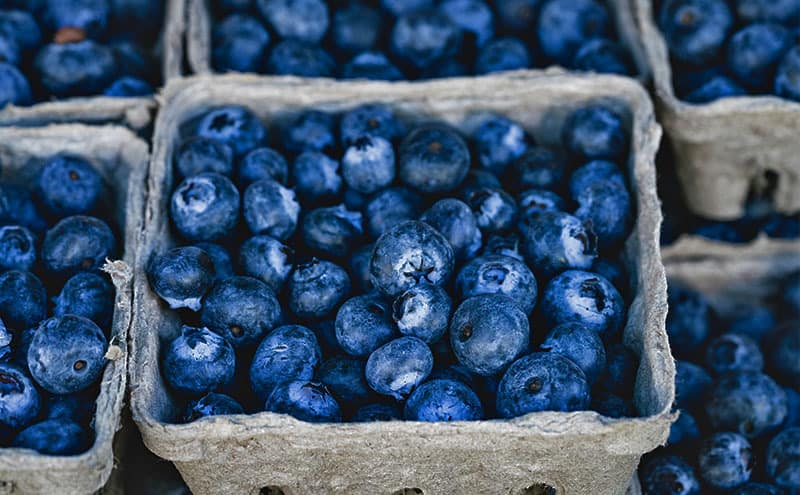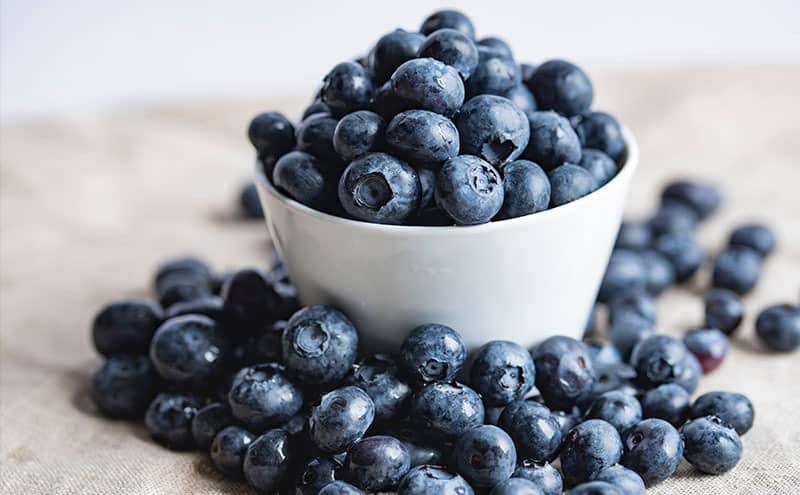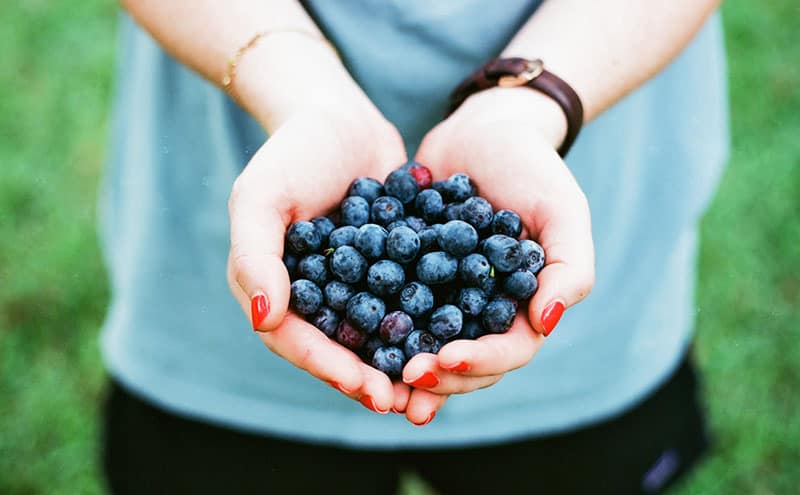
At a Glance
- Blueberries are a tasty fruit packed with vitamins, minerals and other nourishing plant compounds
- Research indicates that blueberries contain one of the highest levels of antioxidants of any widely available fruit or vegetable
- As well as zapping harmful free radicals in the body, the nutrients in blueberries can boost the immune system and brain function, decrease bad cholesterol, blood pressure and risk of heart disease and stroke, inflammation and help fight urinary infections.
On their own, in a fruit salad, as a topping for a cheesecake or in a pie – however they come, blueberries are one of the tastiest fruits in most people’s book.
Aside from being incredibly popular and scrumptious, blueberries have hidden talents. They are one of the most nutritious foods around, so there’s no reason not to dive in!
Blueberries were gathered and used for many different purposes by Native Americans for centuries. Before the beginning of the 20th century it was believed that blueberries couldn’t be domesticated
However, in 1911, Elizabeth White, the daughter of a New Jersey farmer teamed up with botanist Frederick Coville. Together they crossbred different blueberry varieties and were cultivating and harvesting blueberries by 1916. (source)
Today, the largest producer of blueberries is the US, harvesting almost 240,000 tons annually! Canada comes second, followed by Poland, Germany and Mexico as the world’s largest blueberry producers. (source)
Let’s explore these delicious little superberries, their health benefits, and what scientific studies say about them.
What Are Blueberries?
Blueberries are the fruit of a flowering shrub native to North America. They are closely related to cranberries, bilberries and huckleberries. Some species of the blueberry shrub reach just ten centimeters in height while others can grow up to four meters tall.
Blueberries are green when they first emerge and gradually darken in color until they reach that luscious indigo blue; they grow to between five and sixteen millimeters.
The size of the mature blueberry depends on the species; which fall into one of two general categories:
Highbush blueberries – these are the kind most commonly cultivated and are the larger fruits we see in stores. Lowbush blueberries are those which come from the smaller species of blueberry shrub. Often called “wild blueberries”, these berries are smaller and richer in nutrients.
Why not try growing your own blueberry plant at home? Check out this informational video:
Blueberry Nutrition
Blueberries are a powerhouse when it comes to providing nutrients. They are low in calories, containing just 57 calories per 100 grams, and consist primarily of water (84 percent) with some carbohydrates and a little fat, including omega-3 and omega-6 fatty acids and protein.
Vitamins in Blueberries
When it comes to vitamins and minerals, blueberries have a very impressive resume. They are particularly high in vitamins K and C, and also contain vitamins E, B6, B1, B2, B3, B5, B9 and A.
Blueberry Mineral Power
Blueberries are equally rich when it comes to minerals. They are a great source of manganese which helps to build healthy bones and teeth. They also contain copper, iron, potassium, calcium, magnesium, phosphorus and zinc. (source)
Phytochemicals
Along with vitamins and minerals, blueberries contain a wide range of phytochemicals. These are chemical compounds which naturally occur in plants and have various protective functions. In plants these compounds are an important part of their defense mechanism against potential dangers such as insect attacks and UV rays.
Research is only just scraping the surface when it comes to the potential benefits of phytochemicals for humans, but some phytochemicals have been identified, and studies indicate they can protect against various different health conditions.
Blueberries contain flavonoids like anthocyanins, anthocyanidins such as delphinidin and malvidin, plus resveratrol, ellagic, chlorogenic and gallic acids. Scientists have found that the particular phytochemicals in blueberries can reduce the risk of several diseases. (source)
Blueberry Health Benefits
With all of the vitamins, minerals and phytochemicals in blueberries, it’s no surprise that each one is tiny little purple powerpack of health benefits.
Here’s a summary of what blueberries can do for you:
Antioxidant Army
Blueberries are a fantastic source of many different antioxidants – compounds capable of absorbing harmful free radicals. These are chemically unstable substances that cause cell damage and can contribute to increased risk of diseases such as cancer as well as the aging process.
Research indicates that blueberries have one of the highest levels of antioxidants of common fruit and vegetables. (source)
One research trial demonstrated a 20 percent increase in protection against free radicals in participants who consumed a liter of mixed blueberry and apple juice every day for just four weeks.
Similar studies have also noted strong antioxidant effects associated with adding freeze dried powdered blueberries in the diet, which is great news if you don’t have access to a fresh source all year round. (source)
Immune System Blueberry Boost
Our immune system is so important for protecting us from all kinds of diseases and infections. One of the important cell types related to immune system function are lymphocytes, white blood cells that recognize antigens – potentially harmful substances – and produce antibodies to destroy them. (source)
Scientific studies have found that including blueberries – particularly lowbush blueberries – in your diet significantly increases the amount of lymphocytes in the body. (source)
Blueberries Blast Cholesterol
Cholesterol is often seen as a bad guy, and while it’s true that a high level of cholesterol in the blood can have a variety of negative effects including increased risk of coronary heart disease and stroke, this isn’t the whole story.
In reality, there are two types of cholesterol. One of them, low density lipoprotein (LDL) cholesterol is bad, but the other, known as high density lipoprotein (HDL) cholesterol is something we can’t live without; we need some cholesterol to make a variety of hormones and other substances vital for good health.
Research studies have identified two different types of LDLs – small and large. The small LDLs are now thought to pose more health problems than their large cousins, due to their high density and unstable nature. According to research large LDLs are not associated with increased risk of heart disease. (source)
A number of the phytochemicals in blueberries have been highlighted as being able to stabilize and reduce oxidized LDLs in the body. Some studies suggest the reduction in LDL oxidation may be as high as 27 percent. (source)
While some studies point out that we should take in a wide variety of fruit and vegetables to obtain the optimum benefits of phytochemicals, there is no doubt that blueberries are highly beneficial in managing cholesterol. (source)
Blueberries and Blood Pressure
According to The American Heart Association high blood pressure, also known as hypertension, is one of the main predicting factors in heart attack and stroke.
High blood pressure puts our artery walls under pressure and can increase the risk of dislodging blot clots. Once free to move in the bloodstream, clots can then cause occlusions or blockages in the relatively small vessels which supply the heart and brain with oxygen and nutrients.
A number of research trials indicate that blueberries contain compounds which are effective in reducing blood pressure. One study on participants who consumed 50 grams of blueberries daily for two months showed a reduction of between four and six percent in blood pressure. (source)
Blueberries may not be as effective at reducing blood pressure as medications like Atenolol, which has been shown in some studies to reduce blood pressure by an average of 9.4 percent, but blueberries come without all of the side effects of prescription medication. (source)
Reduced Risk of Heart Disease and Stroke
Research by The American Heart Association indicates that cardiovascular disease accounts for approximately 2200 deaths every day, and that more than 92 million American adults are living with some form or cardiovascular disease including the after-effects of stroke. (source)
With the combined effect of lower blood pressure and lower levels of oxidized LDL cholesterol, it makes sense that blueberries can help to reduce the risk of heart disease and stroke.
Research supports this too. In an observational study involving more than 90,000 participants, researchers found that a diet high in anthocyanins, of which blueberries are an excellent source, was related to a 32 percent reduction in the risk of having a heart attack.
Reducing the total risk of cardiovascular disease is all about making lots of dietary and lifestyle changes, but there is little doubt that blueberries can help. (source)
Blueberry Brain Power
As the organ responsible for controlling all other functions in the body, including the heart, the brain is without doubt central in health and survival, as well as being our central intelligence agency responsible for learning, cognition and memory.
Several studies on non-human participants have shown that many of the compounds in blueberries are found in specific areas of the brain which have a key role to play in our thought processes and intelligence.
Some research suggests that these compounds have a direct effe
ct on the brain cells and improve the function and communication between them.
In studies on humans, consuming blueberry juice for six weeks produced a markedly positive effect on participants’ ability to learn new information as well as improvements in memory function. (source)
Blueberries Can Lower Insulin Resistance
While fruit is nutritious and good for us, there are conditions which mean people need to carefully monitor the amount of fruit they eat.
According to the American Diabetic Association, over 30 million American suffer from diabetes. Even in the population who don’t have diabetes, research suggests that as many as 31 percent of the population have insulin resistance. (source)
Insulin resistance is a situation where the body doesn’t respond correctly to the hormone insulin which normally acts to remove sugar in the form of glucose from the blood for storage, reducing blood sugar levels.
Resistance to insulin means the body needs to produce higher than usual amounts of insulin to control blood sugar. This can increase the risk of diabetes and cardiovascular disease. (source)
Blueberries do contain some sugar, but at a relatively low level compared to some other fruits. The positive effects of blueberries on insulin resistance, however, seem to outweigh any downsides related to their sugar content.
Scientific studies have shown that the plant compounds in blueberries can have impressive effects when it comes to improving insulin sensitivity. One clinical trial indicated a reduction in insulin sensitivity by an average of 28 percent when taking a blueberry supplement. (source)
Blueberries Help Fight Inflammation
Inflammation can be helpful as part of the body’s normal response to infection or injury, but prolonged inflammation can delay healing and lead to complications.
Inflammation has been identified as having a significant role in conditions such as asthma, chronic ulcers, colitis, Crohn’s disease and arthritis. Some experts are now suggesting chronic inflammation plays a major role in heart disease.
Scientific studies have noted a significant anti-inflammatory effect associated with the plant compounds in blueberries, and suggest they can reduce the risk of a number of diseases and improve the symptoms of many different conditions. (source)
Blueberries and Urinary Infections
Cranberries have long been associated with a reduction in the risk of suffering urinary tract infections (UTIs). They are thought to do so by preventing bacteria such as E. coli from sticking to the walls of the urinary tract, encouraging them to pass out of the body without causing health problems.
As a relative of the cranberry, blueberries have the potential for similar effects. There isn’t the wealth of research on the compounds in blueberries as treatment for UTIs as there is for cranberries, but they have been shown to contain many of the same plant compounds and initial research indicates potential positive effects. (source)
Final Thoughts
So we can see that there are a whole bunch of reason why blueberries are important in our diets for improving health and reducing the risk of a number of different diseases, in addition to their delicious, delicate flavor!
As research on phytochemicals grows in volume, we are starting to discover more and more about these powerful little berries, and we can all benefit from their positive effects on health.



Leave a comment